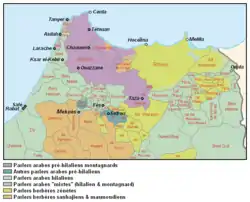Jebli Arabic
Jebli (Jebelia) is a pre-Hilalian Arabic dialect spoken in the mountains of northwestern Morocco.
| Jebli | |
|---|---|
| Jebelia | |
| Native to | Morocco |
| Ethnicity | Jbalas, Ghomaras, Sanhajas de Srayr |
| Language codes | |
| ISO 639-3 | (included in ary) |
| Glottolog | jebl1238 |
 Ethnolinguistic map of northern Morocco: purple represents Jebli-speaking areas, blue represents other pre-Hilalian Arabic-speaking areas (old Urban, Zerhoun and Sefrou area) | |
The historical development of this Moroccan dialect is unclear.
The word jebli means "of/from the mountain". It is mainly spoken in the western and southern Rif by tribes of Sherifian, Berber and Morisco descent over the past ten centuries.
- Jbalas: all its 44 tribes speak Jebli Arabic;
- Ghomaras: out of nine tribes, seven are fully Jebli-speaking, the two remaining are partially Jebli-speaking, with a significant Ghomara Berber-speaking community;
- Sanhajas de Srayr: two Jebli-speaking tribes – Ketama and Aït Seddat – out of ten tribes, the remaining (eight) speak Sanhaja Berber;
- Riffians: out of twenty tribes, six are fully or partially Arabophone; among them, five speak Mountain Arabic − Targuist, Aït Itteftf, Aït Boufrah, Mestasa and Metioua − while the last one (Settout) speak Hilalian Arabic;
- Ghiatas, Maghraouas and Meknassas: the three tribes –that aren't part of any larger confederacy– are fully Jebli-speaking;
- Tribes of Zerhoun (Zerahnas) and the neighborhood of Sefrou (Kechtala, Behalil and Yazgha): although not belonging to the same ethno-linguistic group than Jebalas, their pre-Hilalian dialects are sometimes classified as belonging to the same macro-family (westernmost pre-Hilalian village dialects) as Jebli.
Jebli is heavily influenced by Berber; the grammar of Jebli is almost Berber while most of the words are Arabic. The vocabulary is highly influenced by Spanish.
Examples of Jebli
| Jebli | English translation | Source language/etymology |
|---|---|---|
| trawzez | blue jeans | trousers (English) |
| assallas | darkness | asellas "darkness" (Berber) |
| karretēra | car road | carretera "paved road/highway" (Spanish) |
| ntina | you | (Classical Arabic) |
| âyyəl, ṭfel | boy | عائلة "family" (Classical Arabic); cf. Egyptian Arabic: ˤayyel "child" |
| sṭiṭu | little | (Berber) |
| ħami | warm | حام "feverish" (Classical Arabic); cf. Iraqi Arabic: ħɑ̄mi "warm" |
| qayla | sun | قائلة "resting" (spec. at noon time); due to the time of rest when the sun was at its highest point at noon (Classical Arabic) |
| jjro | dog | jaru "puppy" (Classical Arabic) |
| yəmma | mom | (Berber) |
References
This article is issued from Wikipedia. The text is licensed under Creative Commons - Attribution - Sharealike. Additional terms may apply for the media files.